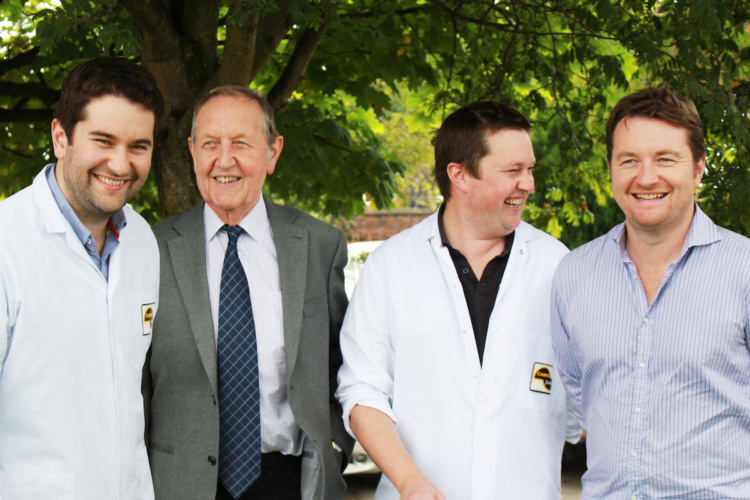Be The Business was established to help address this by enabling SMEs to tap into the expertise of some of the UK most successful and productive organisations. The Engineer spoke to the initiative's corporate affairs manager Mark O’Mahoney about the the help on offer.
What are the key aims of Be the Business?
Led by Chairman Sir Charlie Mayfield, Be the Business was launched in November 2017 with funding and support from the UK government and some of Britain’s leading companies with a mission to increase productivity and performance amongst UK small and medium enterprises.
The UK has some of the most productive companies in the world, but also a ‘majority middle’ of underproductive companies. Despite having some very high performing companies and being considered an industrial leader, the UK lags behind USA, Germany, Japan, and France in terms of productivity. In order to address this, we need to increase productivity amongst a vast number of small and medium businesses.
Be the Business works to identify best practice amongst the UKs most productive firms and helps to transfer this know-how throughout the SME community. We focus on areas where there is a strong evidence base that making small changes can have a big impact on productivity and performance. These are leadership, management practices and technology adoption.

What specific programmes does it offer manufacturers?
The programmes we offer are sector agnostic, and are open to small and medium businesses from any sector. Research shows that making improvements across leadership, management practices or tech adoption can yield performance benefits regardless of sector or size of business.
There is one exception to this, we do focus one suite of programmes on the hospitality sector. As a typically low productivity and high employment sector, often tied to a specific geographic location, we felt that a very targeted intervention was necessary to rapidly increase productivity at scale. In this case we focus on a specific geography, for example Cornwall, and work with a cohort of hospitality businesses to raise productivity across the region.
We have a good blend of light touch supports where a small business owner can visit our website and download an action plan to help them make improve aspects of their business, for example their HR processes, management practices, financial systems or sales strategy. We then have more interactive programmes including leadership development courses which are accredited by the ILM, peer learning groups where groups of like-minded business owners come together weekly to collectively address their business challenges, and online toolkits to help SMEs get the best out of tech. Finally, we also offer quite in-depth interventions such as providing a small business with an advisory board, where for a period of 12 months four independent executives will meet each month with the managing director to help provide advice and guidance on the company strategy. We think there is something there for every business need, the common factor is practicality. We structure these programmes to enable a time poor small business owner to be able to take a small number of actions that can have a big impact on their business.
How are these programs shaped? And how effective are they proving to be?
We are business led, so our programmes are shaped by business and for business. BAE Systems and Rolls Royce have designed some of our leadership programmes; GSK has helped establish our mentoring programmes; Cisco, McKinsey, EY and other firms support us in our tech adoption work; and Lloyds Bank has helped us design supports on finance for SMEs. We aim to take the best industry knowledge and insight and package it up so it’s usable and actionable for small and medium businesses.
We know these programmes are having a positive impact. In addition to conducting interviews with participants and undertaking ongoing assessments and quality checks, we commission an external organization to conduct an independent evaluation of each programme. We want to assess and quantify as accurately as possible the benefit and productivity uplift that each programme delivers.
How have you responded to the pandemic?
At the moment, we are offering the majority of our programmes remotely and we have shifted the focus of some programmes to deal with the short-term priorities and acute challenges that will be facing businesses. Since the onset of the pandemic, we have also begun delivering supports to help SMEs respond to the challenges of lockdown restrictions and reduced demand; innovate their products and services; and plan their recovery strategy. We are focusing quite a bit on helping building resilience into businesses using technology.
One of the most impactful initiatives over the past few months has been our Rapid Response Mentoring programme. Here we match a small business owner with an experienced executive for a period of 12 weeks to help them to work through specific business challenges or develop a recovery plan. With the pandemic, small businesses leaders are having to make business critical decisions on an almost daily basis. A small business owner is unlikely to have a team of advisors or an active board of directors to support them, so having an experienced, independent mentor to give an impartial opinion, provide some guidance or just to act as a sounding board for ideas can be invaluable. This programme has supported around 300 small businesses since March and is rapidly growing.
Why BAE Systems is supporting the Mentoring Programme
"Sitting in the heart of communities, small businesses are vital to the UK's economy and society. In this pandemic, I believe big businesses have a crucially important role to play in helping SMES navigate through the crisis and to grow. BAE Systems' employees didn't hesitate to volunteer their skills and expertise and we have over 100 leaders currently mentoring small business owners from a wide range of sectors across the UK."
Nigel Whitehead, BAE Systems Director of External Affairs
How can SME’s access the help provided by Be the Business?
The vast majority of our programmes and resources are free for SMEs to access and are open to businesses from any sector. We work in partnership with a range of national organisations and regional authorities to help SMEs to access the programmes. Th easiest way to get an idea of the types of programmes we run, and how to get involved, is to visit our website www.bethebusiness.com
Case Study: how a business mentor re-united one family firm behind the same vision
Family-run Carrs Pasties has been manufacturing baked goods in Bolton for over 80 years, but for the third generation – brothers Matt, Joe and Liam – taking over hasn’t been straightforward. A new mentoring scheme turned out to be the expert-led, experience-based support the family firm needed.

Matt Carr remembers how simple running a business seemed when he was a boy. “My dad used to turn up in the morning and bake pasties. Then at the end of each day, we’d have a bit more money. The company’s bigger now and more complex. We’ve pretty much had to learn how to run a business.”
“With Be the Business you get access to an expert with experience in your sector, someone who’s been through the issues or exact growth stage you’re going through. Even if it serves to validate your own instincts and ideas, that’s incredibly valuable.”
Matt talked about the three areas he wanted mentoring to focus on. “Your mentor actually looks into your business and helps you decide what to focus on. At Carrs we wanted to learn how to plan for expansion and maintain productivity as we grew. We also needed help identifying new customer groups.”
Uniting leadership behind same focus
The Mentoring for Growth match-makers introduced Matt to Andrew Peters, MD of Siemens’ motion-control plant in nearby Congleton. An expert in lean manufacturing, Andrew had experience in increasing factory output through productivity and efficiency, rather than expansion. “Andrew came in and helped us focus, almost from the first day. He made us think about what’s important, so we learned to zoom in on just a handful of things,” Matt said.
Getting the leadership team on the same page has also proved to be a huge benefit. “My brothers and I all had slightly different ideas and ambitions about what we wanted from the business” recalled Matt. “It’s natural when you have several people running things, but we really needed to be a united front. The mentoring programme really helped us unify our ambitions and get us working from the same perspective.”
Assigning numbers to commitments
Under the guidance of their mentor, Carrs Pasties has committed to a number of confident growth plan goals over the next two years. Currently doing 90 per cent of business in Bolton where the company was founded, Matt and his brothers are keen to broaden their catchment out to Manchester. “These goals have given us direction and made scaling operations feel attainable. To support the extra production, we’ve committed to building a new bakery in 2021.”










Water Sector Talent Exodus Could Cripple The Sector
Maybe if things are essential for the running of a country and we want to pay a fair price we should be running these utilities on a not for profit...